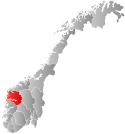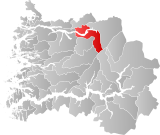Innvik
Innvik Municipality
Innvik herad | |
|---|---|
| Indviken herred (historic name) | |
 View of the local Innvik Church | |
 Sogn og Fjordane within Norway | |
 Innvik within Sogn og Fjordane | |
| Coordinates: 61°51′06″N 06°37′00″E / 61.85167°N 6.61667°E | |
| Country | Norway |
| County | Sogn og Fjordane |
| District | Nordfjord |
| Established | 1 Jan 1838 |
| • Created as | Formannskapsdistrikt |
| Disestablished | 1 Jan 1965 |
| • Succeeded by | Stryn Municipality |
| Administrative centre | Innvik |
| Area (upon dissolution)[1] | |
| • Total | 511 km2 (197 sq mi) |
| Population (1965) | |
| • Total | 3,003 |
| • Density | 5.9/km2 (15/sq mi) |
| Time zone | UTC+01:00 (CET) |
| • Summer (DST) | UTC+02:00 (CEST) |
| ISO 3166 code | NO-1447[2] |
Innvik is a former municipality in the old Sogn og Fjordane county in Norway. The 511-square-kilometre (197 sq mi) municipality existed from 1838 until 1965. Innvik is located in the present-day Stryn Municipality in Vestland county, encompassing about the western third of the present municipality. Innvik included both sides of the Nordfjorden, from Randabygda in the west to just west of the village of Stryn. It stretched from the border with Hornindal Municipality in the north, through the Oldedalen valley all the way to the Jostedalsbreen glacier in the south.[1]
History
[edit]The municipality was established as Indvigen formannskapsdistrikt on 1 January 1838. In 1843, the eastern part of the municipality was separated from Innvik to form the new Stryn Municipality, leaving Innvik with 2,675 inhabitants. On 1 October 1922, the Raksgrenda area (between the villages of Loen and Stryn), with 120 inhabitants, was administratively transferred from Innvik to Stryn. During the 1960s, there were many municipal mergers across Norway due to the work of the Schei Committee. On 1 January 1965, Innvik Municipality and neighboring Stryn Municipality were merged back together, creating a much larger municipality named Stryn. Prior to the merger, Innvik municipality had 3,003 inhabitants.[3]
Name
[edit]The municipality (originally the parish) is named after the old Innvik farm (Old Norse: Víkr) since the first Innvik Church was built there. The original name was the plural form of the word vík which means "small bay", "cove", or "inlet". Some time around the 15th century, the prefix inn (which means "inside" or "inner") was added to distinguish the area from nearby Utvik (meaning "outer" Vik).[1][4] Historically, the name of the municipality was spelled Indviken. On 3 November 1917, a royal resolution changed the spelling of the name of the municipality to Innvik, removing the definite form ending -en and using a "inn" instead of more Danish spelling of "ind".[5]
Government
[edit]During its existence, this municipality was governed by a municipal council of directly elected representatives. The mayor was indirectly elected by a vote of the municipal council.[6]
Municipal council
[edit]The municipal council (Heradsstyre) of Innvik was made up of 25 representatives that were elected to four year terms. The party breakdown of the final municipal council was as follows:
| Party name (in Nynorsk) | Number of representatives | |
|---|---|---|
| Labour Party (Arbeidarpartiet) | 2 | |
| Christian Democratic Party (Kristeleg Folkeparti) | 2 | |
| Centre Party (Senterpartiet) | 8 | |
| Liberal Party (Venstre) | 3 | |
| Local List(s) (Lokale lister) | 10 | |
| Total number of members: | 25 | |
| Party name (in Nynorsk) | Number of representatives | |
|---|---|---|
| Labour Party (Arbeidarpartiet) | 3 | |
| Local List(s) (Lokale lister) | 22 | |
| Total number of members: | 25 | |
| Party name (in Nynorsk) | Number of representatives | |
|---|---|---|
| Labour Party (Arbeidarpartiet) | 4 | |
| Christian Democratic Party (Kristeleg Folkeparti) | 2 | |
| Joint List(s) of Non-Socialist Parties (Borgarlege Felleslister) | 9 | |
| Local List(s) (Lokale lister) | 9 | |
| Total number of members: | 24 | |
| Party name (in Nynorsk) | Number of representatives | |
|---|---|---|
| Labour Party (Arbeidarpartiet) | 3 | |
| Christian Democratic Party (Kristeleg Folkeparti) | 2 | |
| Local List(s) (Lokale lister) | 19 | |
| Total number of members: | 24 | |
| Party name (in Nynorsk) | Number of representatives | |
|---|---|---|
| Labour Party (Arbeidarpartiet) | 2 | |
| Liberal Party (Venstre) | 1 | |
| List of workers, fishermen, and small farmholders (Arbeidarar, fiskarar, småbrukarar liste) | 1 | |
| Joint List(s) of Non-Socialist Parties (Borgarlege Felleslister) | 4 | |
| Local List(s) (Lokale lister) | 16 | |
| Total number of members: | 24 | |
| Party name (in Nynorsk) | Number of representatives | |
|---|---|---|
| Labour Party (Arbeidarpartiet) | 4 | |
| Farmers' Party (Bondepartiet) | 2 | |
| Liberal Party (Venstre) | 2 | |
| Joint List(s) of Non-Socialist Parties (Borgarlege Felleslister) | 9 | |
| Local List(s) (Lokale lister) | 7 | |
| Total number of members: | 24 | |
| Note: Due to the German occupation of Norway during World War II, no elections were held for new municipal councils until after the war ended in 1945. | ||
Mayors
[edit]- 1838-1841: Peter L. Brandt
- 1842-1843: Jørgen Fredrik Spørck
- 1844-1844: Arent Uchermann
- 1845-1845: Lars Olson Bruvoll
- 1846-1849: Ola Olson Flore
- 1850-1851: Anders Rasmusson Faleide
- 1852-1857: Ola Olson Flore
- 1858-1861: Hans Andersson Heggdal
- 1862-1871: Ola Hansson Langve
- 1872-1883: Anders H. Faleide
- 1884-1895: Anders H. Øiestad
- 1895-1908: Rasmus Elias Paulson Sindre (V)
- 1908-1910: Anders A. Drageset
- 1910-1931: Knut A. Taraldset
- 1932-1942: Hallvard R. Sindre
- 1942-1946: Anders J. Rustøen
- 1946-1951: Per Reme
- 1952-1959: Ola Bruland
- 1960-1964: Einar A. Skarstein
See also
[edit]References
[edit]- ^ a b c "Innvik i Sogn og Fjordane". Store norske leksikon (in Norwegian). Archived from the original on 8 October 2013. Retrieved 7 October 2013.
- ^ Bolstad, Erik; Thorsnæs, Geir, eds. (26 January 2023). "Kommunenummer". Store norske leksikon (in Norwegian). Kunnskapsforlaget.
- ^ Jukvam, Dag (1999). Historisk oversikt over endringer i kommune- og fylkesinndelingen (PDF) (in Norwegian). Statistisk sentralbyrå. ISBN 9788253746845.
- ^ Rygh, Oluf (1919). Norske gaardnavne: Nordre Bergenhus amt (in Norwegian) (12 ed.). Kristiania, Norge: W. C. Fabritius & sønners bogtrikkeri. p. 485.
- ^ "Norsk Lovtidende. 2den Afdeling. 1917. Samling af Love, Resolutioner m.m". Norsk Lovtidend (in Norwegian). Kristiania, Norge: Grøndahl og Søns Boktrykkeri: 1057–1065. 1917.
- ^ Hansen, Tore; Vabo, Signy Irene, eds. (20 September 2022). "kommunestyre". Store norske leksikon (in Norwegian). Kunnskapsforlaget. Retrieved 1 January 2023.
- ^ "Kommunevalgene og Ordførervalgene 1959" (PDF) (in Norwegian). Oslo: Statistisk sentralbyrå. 1960. Retrieved 16 February 2020.
- ^ "Kommunevalgene og Ordførervalgene 1955" (PDF) (in Norwegian). Oslo: Statistisk sentralbyrå. 1957. Retrieved 16 February 2020.
- ^ "Kommunevalgene og Ordførervalgene 1951" (PDF) (in Norwegian). Oslo: Statistisk sentralbyrå. 1952. Retrieved 16 February 2020.
- ^ "Kommunevalgene og Ordførervalgene 1947" (PDF) (in Norwegian). Oslo: Statistisk sentralbyrå. 1948. Retrieved 16 February 2020.
- ^ "Kommunevalgene og Ordførervalgene 1945" (PDF) (in Norwegian). Oslo: Statistisk sentralbyrå. 1947. Retrieved 16 February 2020.
- ^ "Kommunevalgene og Ordførervalgene 1937" (PDF) (in Norwegian). Oslo: Statistisk sentralbyrå. 1938. Retrieved 11 May 2020.
- ^ "Ordførarar i Stryn kommune". NRK Fylkesliksikon (in Norwegian). 6 January 2004. Retrieved 17 June 2023.
External links
[edit] Sogn og Fjordane travel guide from Wikivoyage
Sogn og Fjordane travel guide from Wikivoyage- Weather information for Innvik (in Norwegian)

